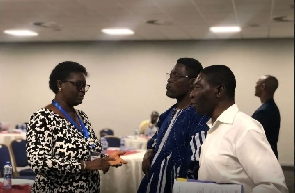 (From L-R) Stella Addo, CIPS Country Manager, Festus Korang MoH & Kofi Essuman, Global Standard
(From L-R) Stella Addo, CIPS Country Manager, Festus Korang MoH & Kofi Essuman, Global Standard
The Centre for Applied Research and Innovation in Supply Chain-Africa (CARISCA), has indicated that the time has come for stakeholders and individuals within the agriculture and health supply chain, to take into consideration the importance of supply chain traceability.
According to the Senior Technical Advisor for continuing professional and executive education at Kwame Nkrumah University of Science and Technology (KNUST), John Frimpong Manso, traceability can help improve the quality of goods on the market.
“I think it is something that Ghana should be interested in. It is important that as a state we take traceability seriously and trace and standardize every process, moving from the point of origin to the stage of consumption. It is important that we study all of them, look at the challenges and address them so that you can be sure that the food and medications that are taken, meet00 international and local standards,” he noted.
He said this during the Supply Chain Action Network (SCAN) event held in Accra under the theme; ‘Supply Chain Traceability: Improving Africa’s Agriculture and Health Sectors’. Supply chain traceability is the process of tracking the origin and journey of products and their inputs from the very start of the supply chain to the end-user.
The Supply Chain Action Network (SCAN) event serves as a platform for thought leaders, policymakers and industry experts to discuss the challenges and opportunities surrounding supply chain traceability in Africa’s agricultural and health sectors.
Participants convened to explore the possibilities for enhancing supply chain traceability to improve the agricultural and health sectors in Africa. The discussions will explore the adoption of cutting-edge technologies and the establishment of effective cross-sector collaborations to enhance supply chain traceability.
He said CARISCA will embark on a continuous discussion with the respective stakeholders and institutions responsible for such operations to ensure the challenges faced are well addressed so that the two sectors of focus by the CARISCA see resilience and achieve better results than before.
CARISCA’s SCAN engages supply chain stakeholders within the country and across Africa to discuss current topics, trends, opportunities and challenges for managing African supply chains. The goal is to create a strong network of policymaking, private sector and civil society organizations to strengthen supply chain research, education and facilitate knowledge transfer.
About CARISCA
CARISCA is poised to improve African supply chains by advancing research, knowledge translation and supply chain management training. Through knowledge exchange, CARISCA is creating a new vision that will transform Ghanaian and African supply chains by growing, innovating, and translating research to inform new solutions for public, private, and non-governmental institutions.
CARISCA said it will reach these goals by critically assessing supply chain barriers to development and stimulating new thoughts that can increase supply chain resiliency and improve Ghanaian livelihoods. CARISCA’s mission is to transform African supply networks through education, research and action.
The integration of innovative technologies, such as blockchain, the Internet of Things (loT) and artificial intelligence, according to them, holds immense promise for improving traceability within Africa’s supply chains. These digital solutions can enable real-time tracking of products, ensuring authenticity and reducing the risk of fraud, counterfeiting and foodborne illnesses.
CARISCA believes collaboration is another essential aspect of supply chain traceability, bringing together stakeholders from different sectors can help create an enabling environment for implementing traceability initiatives.
By working together, these actors can establish harmonized regulatory frameworks, share best practices, and develop public-private partnerships to bolster investment in traceability infrastructure and capacity.